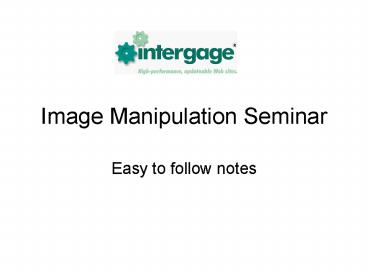Image Manipulation Seminar - PowerPoint PPT Presentation
1 / 34
Title:
Image Manipulation Seminar
Description:
3.Ensure you select a suitable resolution (72 90 for web pages) do this ... 6.Also, sharpening after brightening will give it a little extra zing' (the ... – PowerPoint PPT presentation
Number of Views:217
Avg rating:3.0/5.0
Title: Image Manipulation Seminar
1
Image Manipulation Seminar
- Easy to follow notes
2
Resizing and Optimising an Image Using Paint Shop
Pro 8
3
- 1.Open up the image you wish to use
4
- 2.Resize the image to the required width
5
- 3.Ensure you select a suitable resolution (72
90 for web pages) do this BEFORE selecting a
width
6
- 4.This will be how your image will appear at its
normal size.
7
- 5.We often tweak the brightness (Adjust gt
Brightness Contrast) a touch after resizing as
sometimes the images get a little dull.
8
- 6.Also, sharpening after brightening will give it
a little extra zing (the sharpening process
enhances any white pixels a little).
9
- 7.Now you need to save the image this is not
the save process, but the export process. A
rule of thumb is if its a photo, export as a
jpeg. if its a graphic with a few flat coloured
areas, or just text, or with transparent areas,
then export it as a gif.
10
- 8.You can play with the compression value in
order to get the desired clarity balanced with
the required image size for an image this size
you want to be aiming for under 15 Kb, for
something nearer 3 or 400 pixels wide, then try
to aim under 30 or 40 Kb.
11
- 9.Remember to rename the image, or you will
overwrite the original.
12
- Cutting Out Images And Creating a Montage Using
Paint Shop Pro 8
13
- 1.Open up your image and select the Freehand Tool
14
- 2.If the tool settings are not visible, hit F4.
Now select the desired Selection Type here we
used Smart Edge, but you may find other
techniques are more appropriate to a specific
job. Note the other settings here and maybe see
how different settings affect the task.
15
- 3.The Smart Edge allows you to click, then
click onwards at different corners, or small
stages, around the edge of the area you want to
cut-out.
16
- 4.At the end, double-clicking will make the final
join, and give you a dotted line around your
subject.
17
- 5.If you havent done so already, make sure the
background color has been set to one you want.
18
- 6.Hit delete to lose the old background, and you
will be left with the new flat colored
background. Unselect the subject.
19
- 7.Now use the Magic Wand to cut out the screen.
20
- 8.The screen may look like a flat colour, but in
pixel terms, there will be many shades of dark
grey. This means you need to set the Tolerance
level to something high, to allow the wand to
grab a range of similar colors. Now hit delete,
and you are left with a flat colored background.
21
- 9.Now select an image to put onto the monitor
screen. By selecting all, we can
22
- 10.copy the whole image
23
- 11.and Paste Into Selection. There are different
options to pasting here, so select the right one
for the job.
24
- 12.We can now set a background color to be a
graded one there are many ready-made ones, but
you could experiment with a custom-made one.
25
- 13.We can now cut out the areas around the keys
26
- 14.Then selecting the Flood Fill tool
27
- 15.We can now right-click the background into a
selected areas.
28
- 16.We now need to reduce the overall size of the
image, using the resize tool as before, then we
want to add area above the current image by
increasing the canvas size, so we can stick some
text up there
29
- 17.The Placement arrows allow us to anchor our
current image when the extra canvas area is
added. Also, set the background color here to
match the one we already have.
30
- 18.Now, after setting the background color, use
the Pen tool to draw a freehand shape.
31
- 19.Set a drop shadow effect (or another of your
choice).
32
- 20.Add some appropriate text
33
- 21.Et Voila!
34
It is very likely that when you attempt these
techniques yourself that you discover a quicker
or better technique than the ones we have
described here. There are many ways to achieve a
goal, but depending upon the version of Paint
Shop Pro you use, or whether you use a completely
different photo/graphics package altogether, you
should soon find that with a little practice you
will be able to achieve your desired effects
easily. The Help notes (F1) for any package will
outline any feature/technique you require. Please
remember that Intergage did not write Paint Shop
Pro, and therefore we cannot support any issues
you come across during your image
optimisation/graphic creation. Good Luck.































